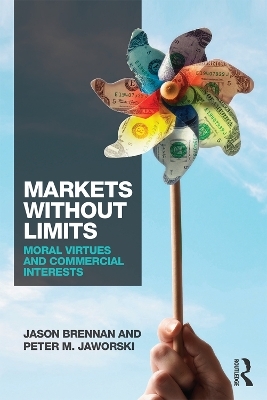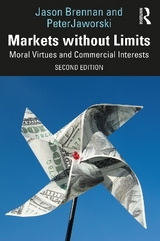
Markets without Limits
Routledge (Verlag)
978-0-415-73735-7 (ISBN)
- Titel erscheint in neuer Auflage
- Artikel merken
Most people shudder at the thought. To put some goods and services for sale offends human dignity. If everything is commodified, then nothing is sacred. The market corrodes our character. Or so most people say.
In Markets without Limits, Jason Brennan and Peter Jaworski give markets a fair hearing. The market does not introduce wrongness where there was not any previously. Thus, the authors claim, the question of what rightfully may be bought and sold has a simple answer: if you may do it for free, you may do it for money. Contrary to the conservative consensus, they claim there are no inherent limits to what can be bought and sold, but only restrictions on how we buy and sell.
Jason Brennan is Associate Professor of Strategy, Economics, Ethics, and Public Policy at Georgetown University’s McDonough School of Business, and, by courtesy, Associate Professor of Philosophy. He is the author of Why Not Capitalism? (Routledge, 2014), Compulsory Voting: For and Against, with Lisa Hill (2014), Libertarianism: What Everyone Needs to Know (2012), The Ethics of Voting (2011), and A Brief History of Liberty, with David Schmidtz (2010). Peter Jaworski is Assistant Teaching Professor of Strategy, Economics, Ethics, and Public Policy at Georgetown University’s McDonough School of Business. Prior to joining the faculty at Georgetown, Peter was Visiting Research Professor at Brown University’s Political Theory Project. He is a senior fellow with the Canadian Constitution Foundation and serves on the Board of Directors of the Institute for Liberal Studies.
Part I: Should Everything Be for Sale? 1. Are There Some Things Money Should Not Buy? 2. If You May Do It For Free, You May Do It For Money 3. What the Debate Is and Is Not About 4. It’s the How, Not the What Part II: Do Markets Signal Disrespect? 1. Semiotic Objections 2. The Mere Commodity Objection 3. The Wrong Signal and Wrong Currency Objections 4. Objections: Semiotic Essentialism and Minding Our Manners Part III: Do Markets Corrupt? 1. The Corruption Objection 2. How to Make a Sound Corruption Objection 3. The Selfishness Objection 4. The Crowding Out Objection 5. The Immoral Preference Objection 6. The Low Quality Objection 7. The Civics Objection Part IV: Exploitation, Harm to Self, and Misallocation 1. Essential and Incidental Objections 2. Line Up For Expensive Equality! 3. Baby Buying 4. Vote Buying Part V: Debunking Intuitions 1. Anti-Market Attitudes Are Resilient 2. Where Do Anti-Market Attitudes Come From? 3. The Pseudo-Morality of Disgust 4. Postscript
| Zusatzinfo | 4 Tables, black and white |
|---|---|
| Verlagsort | London |
| Sprache | englisch |
| Maße | 152 x 229 mm |
| Gewicht | 362 g |
| Themenwelt | Geisteswissenschaften ► Philosophie ► Ethik |
| Sozialwissenschaften ► Soziologie ► Makrosoziologie | |
| Wirtschaft ► Allgemeines / Lexika | |
| Wirtschaft ► Betriebswirtschaft / Management ► Marketing / Vertrieb | |
| Wirtschaft ► Volkswirtschaftslehre ► Wirtschaftspolitik | |
| ISBN-10 | 0-415-73735-4 / 0415737354 |
| ISBN-13 | 978-0-415-73735-7 / 9780415737357 |
| Zustand | Neuware |
| Informationen gemäß Produktsicherheitsverordnung (GPSR) | |
| Haben Sie eine Frage zum Produkt? |
aus dem Bereich



